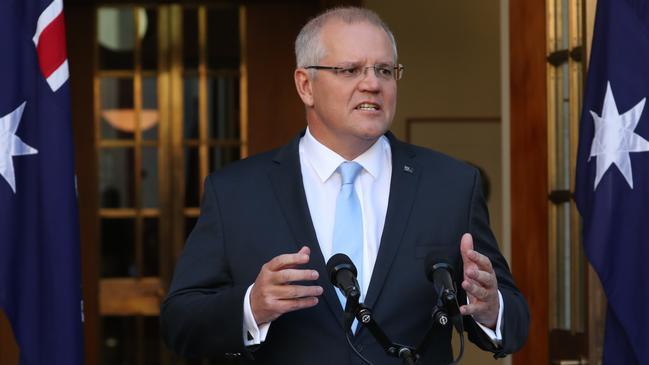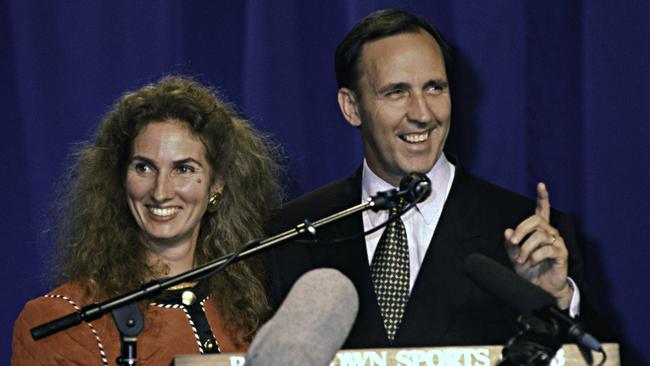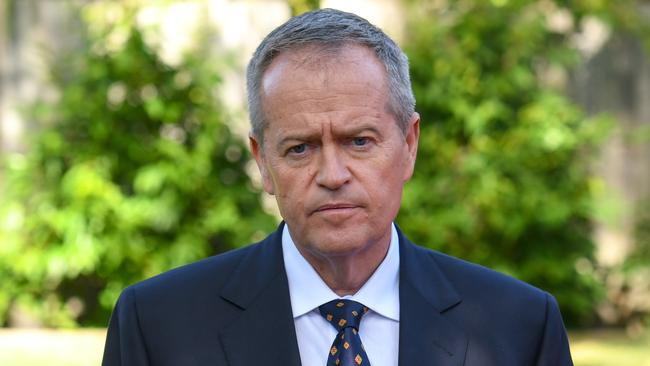David Penberthy: Prime Minister Shorten isn’t a done deal just yet
In times of an election, no one should ever rely on polls, least of all those running for office. And at this stage of the political game, the biggest threat to a Labor win is themselves, writes David Penberthy.
Rendezview
Don't miss out on the headlines from Rendezview. Followed categories will be added to My News.
The biggest threat to Labor’s chances of winning the May 18 federal election is complacency.
It is a complacency born of years of expectation, confirmed by repeated polls, that the Liberal Party, like Labor before it, had become such a factionally-riven, personality-obsessed rabble that there was no way it could, or should, remain in power.
“The adults are back in charge” was the boast of the Liberals when Tony Abbott saw off the repackaged Kevin Rudd in the 2013 election landslide. Since then we have had another two changes of prime minister, in a display of bloodletting every bit as indulgent and juvenile as that of the Rudd-Gillard-Rudd era.
RELATED: Federal election campaign: How long is too long?
Now that the campaign proper is underway, it is less likely that there will be a punishment factor against the Libs for the leadership mayhem they delivered. Both sides have been guilty of this nonsense. There is a big difference between having an angry spray to the telephone operator from Newspoll in response to the latest outbreak of political infighting, versus making a broader and more sober judgment in the form of casting a vote on polling day. This is why the election will be much closer than any of the polls of the past two years have indicated, and why Scott Morrison is still in with a chance.
The manner in which our latest Prime Minister called the election yesterday was a shameless and direct lift from a master political tactician.

In setting the date for the 2019 election, Scott Morrison used the same lines as John Howard in 2004 when he sought an unlikely fourth term against a Labor Party led then by Mark Latham. When confronted with a gargantuan task, it is best to break it down to its core elements. John Howard declared that the 2004 election was all about trust. Who do you trust to run the economy and keep our borders secure. It was the exact same approach from Scott Morrison, as he tried to pare the election down to his preferred essentials and fight it on the Liberals’ home turf of economic management and national security.
RELATED: ScoMo’s fair dinkum election plan is failing
If 2004 provides the Liberals with a template for their positive narrative, they can craft their negative campaign around one of the darkest periods of their own history, the 1993 poll. For the Liberals, 1993 was the so-called unlosable election, with the abrasive Paul Keating leading Labor in its almost greedy bid for a fifth consecutive term. Despite having been treasurer through a punishing recession, and being unloved by many voters, Keating pulled off a miracle by staring down and holding off John Hewson’s Liberals.
As Keating himself acknowledged in his election night victory speech, a chief reason for this was the unnerving and nation-altering suite of policies Hewson had put to the people in his Fightback! and Jobsback! packages, central to which were full workplace deregulation and the introduction of a hard-to-explain 15 per cent goods and services tax.

Like Hewson, Bill Shorten has done a lot of policy work, which can easily be turned into the mother of all negative campaigns for the Liberals. Shorten is vulnerable to an all-out attack on his agenda as too radical and too dangerous in terms of its potential economic impact. When you combine the changes to retirement savings through franking credits, a living wage case that may undermine the viability of small businesses, and a blitz on negative gearing that might push up rents, the Liberals are operating in a target-rich environment when it comes to painting a Shorten Government as an alarming economic unknown.
MORE FROM DAVID PENBERTHY: Why the SA Liberals aren’t the clear winners at the election
From a South Australian perspective, the depressing news is that this election campaign will confirm our drifting influence on the national political landscape. For the Libs to hold power they must hold all their seats or offset any modest losses with gains in seats such as Lindsay, Wentworth and Macquarie in suburban Sydney, the three marginals in Tasmania. Their rearguard action to hold what they have will be fought almost exclusively in Queensland, NSW and Victoria.
Labor’s hit-list of potential gains is focused largely in Victoria, with about five marginal Liberal seats all up for grabs, and another six seats spread between Queensland and NSW. The added bonus for Labor in suburban Sydney is the highly possible loss of the polarising former PM Tony Abbott to an independent candidate in Olympian Zali Steggall.

Against this backdrop there is no tactical reason for either Scott Morrison or Bill Shorten to spend any time in South Australia at all over the coming five weeks. The number of SA seats has fallen from 13 to 10 in less than 20 years as our population has declined. There is just one SA electorate, Boothby, held by Nicolle Flint with a 2.7 per cent margin, that is counted as marginal. And in that seat, where Labor spent more than a decade falsely convincing itself it was a chance of beating Andrew Southcott, they appear to be fantasising again about reclaiming this southern suburban seat for the first time in decades. Flint has a fight on her hands, and will be doing everything she can as per the tactics outlined above to urge older voters and small business voters not to risk their savings and incomes on a Shorten Government. She is being targeted by the left-wing activist organisation GetUp!, which got off to a less than menacing start on Wednesday when it rolled out the big guns in the form of children’s entertainer Peter Combe to target her seat, at an event that attracted exactly 11 people.
RELATED: Morrison’s election tactics don’t come cheap
It is the only South Australian seat that may change hands in an election campaign where almost every key battle will be fought up and down the eastern seaboard. The one upside I suppose is that we are less likely to be harassed or have our babies kissed when we are down at the supermarket.
Originally published as David Penberthy: Prime Minister Shorten isn’t a done deal just yet


